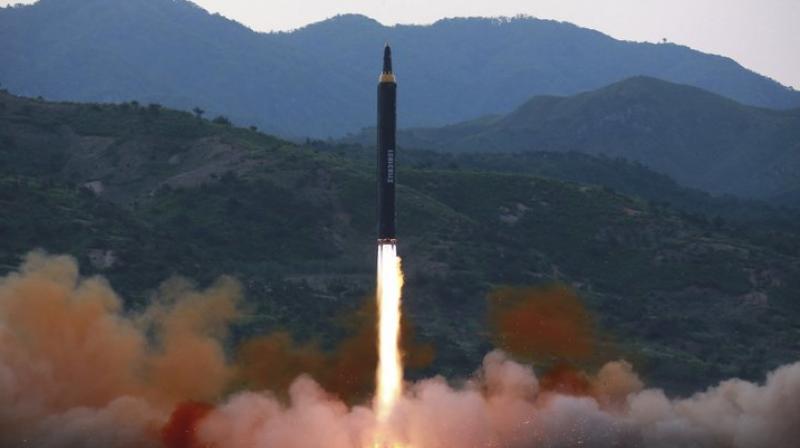Chronology of North Korean missile development
North Korea has fired a ballistic missile over Japan, days after the international community further tightened its sanctions.

Seoul: For the second time in less than a month, North Korea has fired a ballistic missile over Japan, days after the international community further tightened its sanctions over its banned weapons and nuclear programme.
Here's how the programme got to where it is:
Late 1970s: North Korea starts working on a version of the Soviet Scud-B (range 300 kilometres or 186 miles). Test-fired in 1984
1987-92: Begins developing variant of Scud-C (500 km), Rodong-1 (1,300 km), Taepodong-1 (2,500 km), Musudan-1 (3,000 km) and Taepodong-2 (6,700 km)
Aug 1998: Test-fires Taepodong-1 over Japan
Sept 1999: Declares moratorium on long-range missile tests as ties with US improve
March 3, 2005: Ends moratorium on long-range missile testing, blaming Bush administration's "hostile" policy
Oct 9, 2006: First underground nuclear test
May 25, 2009: Second underground nuclear test, several times more powerful than the first
December 13, 2011: Leader Kim Jong-Il dies, is succeeded by his son Kim Jong-Un
December 12, 2012: The North launches multi-stage rocket and successfully places satellite in orbit
February 12, 2013: Third underground nuclear test
January 6, 2016: Fourth underground nuclear test, which Pyongyang claims was hydrogen bomb
March 9, 2016: Kim Jong-Un claims the North has successfully miniaturised a thermo-nuclear warhead
April 23, 2016: North test-fires a submarine-launched ballistic missile
July 8, 2016: US and South Korea announce plans to deploy an advanced missile defence system -- the US THAAD (Terminal High Altitude Area Defense)
August 3, 2016: North Korea fires a ballistic missile directly into Japanese-controlled waters for the first time
August 24, 2016: Successfully test-fires another submarine-launched ballistic missile
September 9, 2016: Fifth nuclear test
February 12, 2017: Tests ballistic missile, which flies about 500 kilometres (310 miles) before falling into the Sea of Japan
March 6, 2017: North fires four ballistic missiles in what is says is an exercise to hit US bases in Japan
March 19, 2017: North Korea says it has tested a new rocket engine
April 5, 2017: North Korea fires a ballistic missile into the Sea of Japan
May 2, 2017: THAAD anti-missile system goes operational in South Korea
May 14, 2017: North fires what it says is a "newly-developed mid/long-range strategic ballistic rocket, Hwasong-12", which flies 700 kilometres before landing in the Sea of Japan
May 29, 2017: Test fires a short-range ballistic missile which lands in Japan's exclusive economic zone
June 8, 2017: North Korea launches what it claims is new type of 'cruise rocket'
June 22, 2017: North Korea tests a rocket engine which could be fitted to an intercontinental ballistic missile (ICBM) ahead of South Korean President Moon Jae-In's first trip to Washington since taking office
July 4, 2017: North Korea says it successfully tests an ICBM which is capable of reaching Alaska. Kim Jong-Un says it is a gift for the "American bastards"
July 28: Second successful ICBM test
August 6, 2017: UN Security Council unanimously adopts tougher sanctions on the North
August 9, 2017: US President Donald Trump threatens Pyongyang with "fire and fury" over its missile program
-- Hours later, North Korea says it is considering strikes near US strategic military installations in Guam
August 29, 2017: North Korea fires a ballistic missile over Japan. Tokyo says it is an "unprecedented, serious and grave threat"
September 3, 2017: North Korean state media claims the country has developed a hydrogen bomb which can be loaded into ICBM -- North conducts its sixth and largest yet nuclear test. Monitoring groups estimate a yield of 250 kilotons, which is 16 times the size of the 15-kiloton US bomb that destroyed Hiroshima in 1945
September 4: South Korea and the US say they will deploy more anti-missile defences
September 12, 2017: UN Security Council unanimously adopts new sanctions, slapping a ban on textile exports and restricting shipments of oil products to North Korea
September 15: North Korea fires a ballistic missile over Japan and into the Pacific, responding to new UN sanctions with what appears to be its furthest-ever missile flight.

